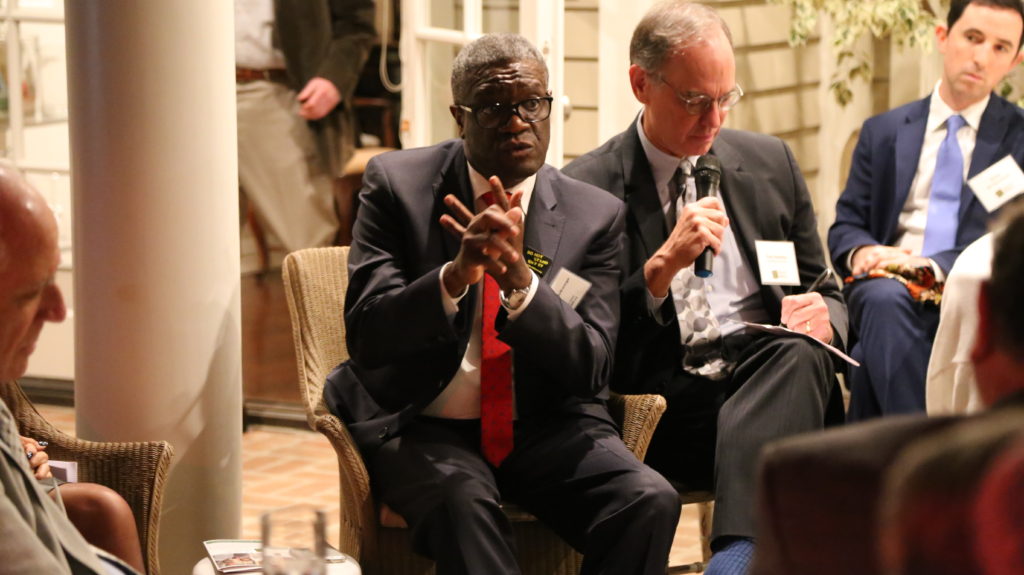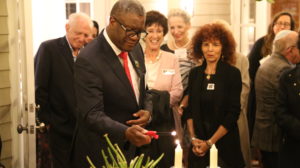Recently, Jewish World Watch had the honor of hosting Dr. Denis Mukwege — our long-time on-the-ground partner and 2018 Nobel Peace Prize Laureate — in conversation with our Board Co-Chair, Diana Buchantz. Dr. Mukwege, a gynecological surgeon and activist, won the Nobel for his inimitable commitment to combatting rape as a weapon of war in the Democratic Republic of the Congo, and for his holistic approach to helping survivors.
Mukwege described how he began his career hoping to reduce maternal mortality in a country where death during childbirth was a common occurrence. Yet by the 1990s, as civil war in his country unfolded, replete with mounting mass atrocities, his focus evolved into empowering women affected by gender-based violence at his Panzi Hospital. Over the years he has developed a 360-degree approach to combatting the effects of rape and other sexual violence.
What started with a purely medical approach has expanded to include post-surgical rehabilitation, psychosocial care, education, vocational and livelihood programming, community reintegration, and legal redress. As he followed women along their journey to recovery, he identified gaps and stretched his efforts in order to fill them, eternally inspired by the resilience of his patients: “We go through this whole process because we see that these women who are actually remarkably strong can change their pain into power and transform their communities,” he shared.
Dr. Mukwege has witnessed unconscionable things. At one point, he was so traumatized by the brutality he had seen that he stopped practicing medicine for two years. But once he recovered, Panzi Hospital was born. He told stories of heinous acts perpetrated against women and girls as young as 18 months old. He is the healer who pieces them back together. But he also shared a particularly poignant story of bottomless strength.
Some years ago, Dr. Mukwege and his family had to flee to the United States when their lives were threatened. While he was gone, a group of women he had helped to heal on multiple levels — physically, emotionally, psychologically, socioeconomically, even legally — began writing letters to various powerful people, asking them to help bring their good doctor home.
They wrote to the president of the Congo and the UN Secretary-General but received no reply. Finally, they wrote to Dr. Mukwege, promising to pay for his journey home and guarantee his safety. They set up a market at Panzi Hospital every Sunday to raise money for plane tickets, squirreling away every cent they earned. They beseeched Dr. Mukwege to return to them. Their determination convinced him, his wife, and daughters to make the difficult decision to return home. When he arrived at the hospital, the women whose lives he had touched came out in droves to greet him. They promised to form a 24-hr human shield around his hospital so that no one could ever harm him. Recounting the day, Dr. Mukwege said, “They put out a message: ‘beware if you want to kill this man you’re going to have to kill thousands of us.’ These are women we thought of as vulnerable, but they were stronger than me,” he said.

Dr. Denis Mukwege explaining his work in the Democratic Republic of the Congo
When asked what continues to drive him, despite all the atrocities he has witnessed, all the bodies he has had to put back together, Dr. Mukwege cites, without hesitation, the boundless perseverance of the women he has encountered and served.
“I do what I do because I’ve seen unbelievable women. When you operate on a woman and she wakes up, her first questions are: ‘Where is my child? Where is my husband? Has he eaten?’ The strength in women is to look at everyone else. I’m very small next to these extraordinary women. They’re going through formidable things and when they stand up they don’t do it for themselves, but for others.” He went on to say that working with these women and helped him to identify his true calling, the real purpose of his life: “I realized that my mission is not for myself, but to help others. Our lives start to make sense when we begin to give sense to other people’s lives.”
Jewish World Watch is honored to be able to continue our longstanding partnership with this true hero of a man. We are supporting Dr. Mukwege’s rapid response missions — an innovative new endeavor that brings his holistic model of multifaceted care to the most vulnerable far-flung communities in the Congo. The missions transport his comprehensive team of medical care, psychological assistance, community reintegration, and legal aid workers directly to nearly impossible-to-reach villages where whole communities have been brutalized by mass rape campaigns. The missions require tremendous coordination and many dedicated staff members across various sectors to pull off, but they demonstrate how Dr. Mukwege continues to push the envelope and stretch his capabilities to ensure that the most vulnerable in the Congo are served, empowered, and protected from future abuse.
Dr. Mukwege has always said that Jewish World Watch’s motto “do not stand idly by” resonated deeply with him, capturing his internal restlessness to keep finding new and better ways to empower not only the women of the Congo, but rape survivors worldwide. He sees the mission of Jewish World Watch as very much aligned with his own. “To rape a woman,” he said, “is to deny her humanity — to say you’re not like us. There’s nothing worse than considering someone the other … That’s to reduce someone — to destroy them.” This “othering” is precisely what Jewish World Watch was created to rally against and prevent, wherever it happens around the globe.
We are bound to Dr. Mukwege not only in our relentless fight against dehumanization but also in our commitment to the dignity and humanity of survivors who continue to stand up and fight for their own dignity, despite having been subjected to the most heinous of crimes. We are honored to not stand idly by together with this great man.


